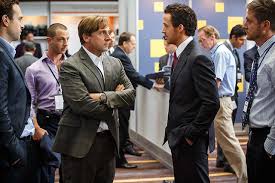A BIT SHORT: The Big Short and The Hateful Eight
Posted: December 23, 2015 | Author: Donald | Filed under: Uncategorized | Tags: Adam McKay, Brad Pitt, Bruce Dern, Channing Tatum, Charles Randolph, Christian Bale, Damian Bichir, Ennio Morricone, Jennifer Jason Leigh, Karen Gillan, Kurt Russell, Melissa Leo, Michael Lewis, Michael Madsen, Quentin Tarantino, Ryan Gosling, Samuel L. Jackson, Steve Carrell, The Big Short, The Hateful Eight, Tim Roth, Walton Goggins | 1,892 Comments »First, a word from our sponsors: I am now offering a new service: so much emphasis has been given lately to the importance of the opening of your screenplay, I now offer coverage for the first twenty pages at the cost of $20.00. For those who don’t want to have full coverage on their screenplay at this time, but want to know how well their script is working with the opening pages, this is perfect for you. I’ll help you not lose the reader on page one.
Ever wonder what a reader for a contest or agency thinks when he reads your screenplay? Check out my new e-book published on Amazon: Rantings and Ravings of a Screenplay Reader, including my series of essays, What I Learned Reading for Contests This Year, and my film reviews of 2013. Only $2.99. http://ow.ly/xN31r
and check out my Script Consultation Services: http://ow.ly/HPxKE
Warning: SPOILERS
 The Big Short, like Spotlight, is the one of those movies ripped from the headlines—of years and years ago; but this time the subject is not pedophile priests, but the downfall of the American economy. Written by Charles Randolph and the director Adam McKay, from a book by Michael Lewis, it’s also a very satisfying bit of agitprop theater with Brechtian distancing devices thrown in for good major.
The Big Short, like Spotlight, is the one of those movies ripped from the headlines—of years and years ago; but this time the subject is not pedophile priests, but the downfall of the American economy. Written by Charles Randolph and the director Adam McKay, from a book by Michael Lewis, it’s also a very satisfying bit of agitprop theater with Brechtian distancing devices thrown in for good major.
It basically tells the story of four different groups of people who all realized, more or less at the same time, and years ahead of schedule, that the housing mortgage bubble was going to burst in 2007 and destroy the world’s economy.
This leads to the movie’s major irony: the people who figured this out then proceed to invest heavily against the U.S. economy, making tons of money when their Cassandra like prediction of doom came true.
So basically, we in the audience, along with the characters in the movie, find ourselves and themselves actually hoping that the U.S. financial system tanks like the Titanic. Read the rest of this entry »
LAST BUT NOT LEAST: Movie reviews of Selma and Big Eyes by Howard Casner
Posted: January 16, 2015 | Author: Donald | Filed under: Uncategorized | Tags: Amy Adams, Ava DuVerney, Big Eyes, Carmen Ejogo, Christoph Waltz, Danny Huston, DAvid Oyelowo, Jason Schwartzman, Krysten Ritter, Larry Karaszewski, Margaret Keane, Oprah Winfrey, Paul Webb, Scott Alexander, Selma, Terence Stamp, Tim Burton, Tim Roth, Tom Wilkinson | 9 Comments »First, a word from our sponsors. Ever wonder what a reader for a contest or agency thinks when he reads your screenplay? Check out my new e-book published on Amazon: Rantings and Ravings of a Screenplay Reader, including my series of essays, What I Learned Reading for Contests This Year, and my film reviews of 2013. Only $2.99. http://ow.ly/xN31r
Warning: SPOILERS
The title of these reviews is called Last But Not Least because Big Eyes and Selma are the final two movies I’m going to include under my 2014 reviews. After this, all films will fall under my 2015 reviews, no matter whether they were released in 2014 or not.
So off we go.
 The strongest aspect of Big Eyes, the new bio-com written by Scott Alexander and Larry Karaszewski and directed by Tim Burton, is the art direction and production design.
The strongest aspect of Big Eyes, the new bio-com written by Scott Alexander and Larry Karaszewski and directed by Tim Burton, is the art direction and production design.
Beginning in the 1950’s, the sets, the costumes, the look, the colors all have a poodle skirt playfulness about them that gives the movie some much needed energy.
This should probably be of no surprise since Burton has always had one of the more striking visual eyes in movies today, from Edward Scissorhands to Ed Wood to Alice in Wonderland. If nothing else, his films can be fun to watch.
But outside of that, there is almost nothing that works in this movie. Nothing, and almost amazingly so. Read the rest of this entry »
Review of Movie ARBITRAGE by Howard Casner
Posted: September 23, 2012 | Author: Donald | Filed under: Uncategorized | Tags: Arbitrage, Brit Marling, Chris Eigeman, Monica Raymund, Nicholas Jarecki, Richard Gere, Stuart Margolis, Tim Roth | 237 Comments »Shortly into the movie Arbitrage, the new 1% thriller written and directed by Nicholas Jarecki, I began to wonder whether I stumbled into the wrong theater. According to the previews; reports from friends; reviews; etc., I was expecting a story about a semi-sociopathic financier, a Bernie Madoff type, who would do anything and betray anyone to survive (including his virtuous and untainted daughter), and who was about to pull off a deal that would destroy everyone but himself, but who is temporarily derailed when he causes a Ted Kennedy Chappaquiddick type accident that results in the death of his mistress via manslaughter. He is then pursued by two righteous police officers and a D.A. who are tired of the wealthy getting away with murder.
That is not the movie I saw.
Instead, I saw a film about a financier noble in heart, though weak in action, who desperately, and by, yes, illegal methods, is trying to save his company before it goes belly up, costing him not just everything he has, but also the savings and money of all his investors and the jobs of all those who work for him (including his daughter). After a horrifying accident not caused by manslaughter (unless I’m simply unaware of the intricate parsings of said term—and I very well might be), but by the character falling asleep at the wheel, his greatest crime is leaving the scene of an accident. He is then pursued by a sociopathic officer who seems to have some sort of personal vendetta against the wealthy man (though none is every revealed), to such an extent that he willfully manufactures evidence and gets the DA to lie to a grand jury in order to convict the financier for something he didn’t to (our taxpayer dollars at work, I guess).
Okay, po-tay-to, po-tah-to. But you can see where I’m coming from.
In the end, though, even looking at the movie from my point of view, Arbitrage is not much more than an entertaining enough thriller that gets the job done. It’s not quite a roller coaster ride, but it’s not boring. Just a bit of a let down.
The cast is headed by Richard Gere as Robert Miller, the non Bernie Madoff/non-Ted Kennedy, Bernie Madoff/Ted Kennedy role. Gere’s charming, though I think he’s been better in recent years. But he has one great scene where his character finally traps the illusive Mayfield, the businessman who keeps putting of buying Miller’s business, and Miller shows the brass balls that made him what he is. He out bluffs said Mayfield and finally gets a deal that saves anyone and everyone.
There are some nice faces in the supporting roles, like Stuart Margolis as Syd Felder, Miller’s lawyer who gives Miller (what seems to be to me) questionable legal advice; and Chris Eigeman as Miller’s almost Zen like business manager. Both are welcome sights.
As for the rest, Tim Roth plays his “righteous” officer role rather broadly, in the way that actors often do if they don’t find their characters inherently interesting (probably a good choice here since his role isn’t particularly interesting). Susan Sarandon is around to pick up a paycheck. And the extras are filled out with some of the tallest Amazonian secretaries I’ve ever seen, which may suggest something about Jarecki and/or the casting director that I’d rather not know.
Perhaps the two characters that are written the most puzzling are Brooke, Miller’s daughter (played by Brit Marling) and his surprisingly dowdy mistress Reina (played by Monica Raymund). Both are just a bit too incredibly naïve for me to have any empathy for.
Brooke is suppose to be this alpha female financier, but in all the years she’s been in the business, has yet to grasp the concept of imperfection in her parents. She’s shocked, shocked (in the best Captain Renault manner) that her father is involved in some shady dealings. Really? I mean…Really? When Sarandon talks about it, she acts like Brooke just lost her virginity when her daughter’s at least thirty years old, for God’s sake. (It reminded me of the reaction from all these men about what happened between Monica Lewinsky and Clinton—an “how dare you with my daughter” type response that only made me think: “you do realize she is over twenty one, right? Just how long were you planning on protecting her virginity, anyway?”)
Reina, meanwhile, spends most of her time pouting because she’s not the center of her patron’s universe and is just now realizing that her lover is not going to leave his wife. Again, really? I mean…Really? She also seems incredibly ungrateful that Miller pays for her luxurious apartment that no artist could ever hope to afford in New York; arranges shows for her; and buys her paintings. At one point, Miller tells his daughter, “You’re not my partner, you’re my employee.” I felt that this line would be much more appropriately delivered to Reina.











